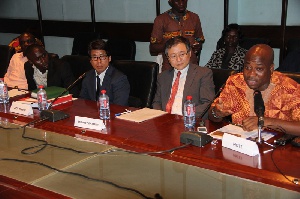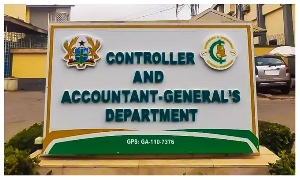Mr. Muntala Mohammed, a Deputy Minister of Trade and Industry (MOTI), has urged Japan to assist African, especially Ghana, to build her human capacity better than giving her financial aid.
At a media briefing on the National Kaizen Project, funded by the Japanese Embassy and Japan International Cooperation Agency (JICA), he said he believed that Ghana should not rely on interventions which handed monies to countries to implement projects; but on those that helped to build the capacity of entrepreneurs and the human resource base.
“As an individual, I am completely opposed to the kind of assistance where money is given to us to execute projects,” he stated. “I am fully convinced that assistance that helps to build the capacity of our entrepreneurs, which helps to build the capacity of our human resource base, is sine qua non to our socio-economic development and Kaizen could not have come at a better time”.
The National KAIZEN Project is a three-year intervention, aimed at developing the capacity of the National Board for Small Scale Industries (NBSSI) to provide Business Development Services, including the KAIZEN methodology to Micro, Small and Medium enterprises (MSMEs), in Ghana.
The briefing was to update the media about the progress of the pilot project and its expansion to the other regions of the country.
Mr. Mohammed said the impact of the Kaizen Project, especially in rural areas, was very significant.
He said the interventions proposed by the KAIZEN Methodology, included measures to eliminate waste in the conveyance and motion and accumulation, inventory control, layout optimisation, process improvement, cost reduction, and quality assurance.
He said the enterprises knew these elements were important but they lacked the capacity to implement them.
“I don’t think when they begin training you, it’s something you cannot do, all you need is to sustain it, and I believe the contract can be renewed because it is achieving its intended results,” he said, adding, the MOTI also had a policy that was aimed at supporting interventions that led to domestic production, such as the KAIZEN intervention.
He also appealed for help to build the capacity of local producers to package their products better so as to be able to sell locally and also for the international market in addition to the establishing a KAIZEN Institute in Ghana to serve West Africa, as it had done in Ethiopia.
Mr. Shigeru Umetsu, the Deputy Chief of Mission of the Embassy of Japan, said Japan’s contribution to Ghana and Africa was focused on strengthening every individual to contribute to the sustainable development of their countries.
He said through the Kaizen Project, Japan was contributing to human resources development in Ghana, and represented a success story, especially because the concept could be applied in other sectors such as Education; and to the individual.
“I strongly believe that this Kaizen Project will contribute to the steady development of SMEs in Ghana and that Ghana will be one of the most successful countries of Kaizen at the end of the project in January 2019,” he stated.
Reports on three of the enterprises where Kaizen had been implemented, he said, had produced significant results including reduction in production time, increase in productivity as well as a safer working environment.
The enterprises are A. A. Agyei Enterprise, producers of Sandals for Senior High Schools, Salom Pharmacy Limited, which produces syrups, capsules and tablets, and Vicalex Brick and Tile Company Limited, producers of clay bricks.
The expansion of the project would cover four target regions: Ashanti, which is being covered in the first phase, Brong Ahafo, Northern and Central Regions, where the heads of 46 Business Advisory Centre would be trained in the Kaizen Methodology.
Mr. Norihito Yonebayashi, a Senior Representative of JICA, said for the easy implementation of the project activities, each target region would be focused in a particular year.
Thus 2016 would be dedicated to the Northern Region, 2017 for Brong Ahafo, and 2018 for Central Region.
A total of 190 SMEs would benefit from the project in the three regions.
Mr. Lukman Abdul-Rahim, the Executive Director of the NBSSI, said the specialists from JICA were training the heads of the BACs to be able run the project after their departure.
He promised the Japanese Embassy and JICA that the resources committed would help to improve the productivity of SMEs in Ghana.
He urged the media not only to focus on sensational stories but also create awareness on the effectiveness of the Kaizen Methodology and its impacts in Ghana.
Captions
Picture 1493 shows Mr Abdul-Rahim speaking at the ceremony
Pictures 1603 and 1610 show Mr. Mohammed addressing the meeting, looking on are Mr. Umetsu and Mr. Yonebayashi.
Business News of Thursday, 24 March 2016
Source: GNA













